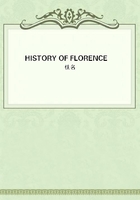
第149章
In this agitated state of the city, some, to whom civil discord was extremely offensive, thought it would be well to endeavor to engage men's minds with some new occupation, because when unemployed they are commonly led by whoever chooses to excite them. To divert their attention from matters of government, it being now a year since the death of Cosmo, it was resolved to celebrate two festivals, similar to the most solemn observed in the city. At one of them was represented the arrival of the three kings from the east, led by the star which announced the nativity of Christ; which was conducted with such pomp and magnificence, that the preparations for it kept the whole city occupied many months. The other was a tournament (for so they call the exhibition of equestrian combats), in which the sons of the first families in the city took part with the most celebrated cavaliers of Italy. Among the most distinguished of the Florentine youth was Lorenzo, eldest son of Piero, who, not by favor, but by his own personal valor, obtained the principal prize. When these festivals were over, the citizens reverted to the same thoughts which had previously occupied them, and each pursued his ideas with more earnestness than ever. Serious differences and troubles were the result; and these were greatly increased by two circumstances: one of which was, that the authority of the balia had expired; the other, that upon the death of Duke Francesco, Galeazzo the new duke sent ambassadors to Florence, to renew the engagements of his father with the city, which, among other things, provided that every year a certain sum of money should be paid to the duke. The principal opponents of the Medici took occasion, from this demand, to make public resistance in the councils, on pretense that the alliance was made with Francesco and not Galeazzo; so that Francesco being dead, the obligation had ceased; nor was there any necessity to revive it, because Galeazzo did not possess his father's talents, and consequently they neither could nor ought to expect the same benefits from him; that if they had derived little advantage from Francesco, they would obtain still less from Galeazzo; and that if any citizen wished to hire him for his own purposes, it was contrary to civil rule, and inconsistent with the public liberty. Piero, on the contrary, argued that it would be very impolitic to lose such an alliance from mere avarice, and that there was nothing so important to the republic, and to the whole of Italy, as their alliance with the duke; that the Venetians, while they were united, could not hope either by feigned friendship or open war to injure the duchy; but as soon as they perceived the Florentines alienated from him they would prepare for hostilities, and, finding him young, new in the government, and without friends, they would, either by force or fraud, compel him to join them; in which case ruin of the republic would be inevitable.
The arguments of Piero were without effect, and the animosity of the parties began to be openly manifested in their nocturnal assemblies;the friends of the Medici meeting in the Crocetta, and their adversaries in the Pieta. The latter being anxious for Piero's ruin, had induced many citizens to subscribe their names as favorable to the undertaking. Upon one occasion, particularly when considering the course to be adopted, although all agreed that the power of the Medici ought to be reduced, different opinions were given concerning the means by which it should be effected; one party, the most temperate and reasonable, held that as the authority of the balia had ceased, they must take care to prevent its renewal; it would then be found to be the universal wish that the magistrates and councils should govern the city, and in a short time Piero's power would be visibly diminished, and, as a consequence of his loss of influence in the government, his commercial credit would also fail; for his affairs were in such a state, that if they could prevent him from using the public money his ruin must ensue. They would thus be in no further danger from him, and would succeed in the recovery of their liberty, without the death or exile of any individual; but if they attempted violence they would incur great dangers; for mankind are willing to allow one who falls of himself to meet his fate, but if pushed down they would hasten to his relief; so that if they adopted no extraordinary measures against him, he will have no reason for defense or aid; and if he were to seek them it would be greatly to his own injury, by creating such a general suspicion as would accelerate his ruin, and justify whatever course they might think proper to adopt.
Many of the assembly were dissatisfied with this tardy method of proceeding; they thought delay would be favorable to him and injurious to themselves; for if they allowed matters to take their ordinary course, Piero would be in no danger whatever, while they themselves would incur many; for the magistrates who were opposed to him would allow him to rule the city, and his friends would make him a prince, and their own ruin would be inevitable, as happened in 1458; and though the advice they had just heard might be most consistent with good feeling, the present would be found to be the safest. That it would therefore be best, while the minds of men were yet excited against him, to effect his destruction. It must be their plan to arm themselves, and engage the assistance of the marquis of Ferrara, that they might not be destitute of troops; and if a favorable Signory were drawn, they would be in condition to make use of them. They therefore determined to wait the formation of the new Signory, and be governed by circumstances.